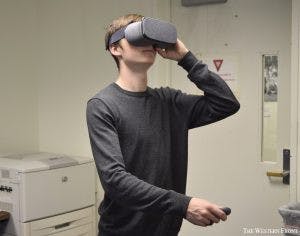Immersing oneself in a fabricated world that feels real is no longer just an idea of the future. Virtual reality seminars have begun at the Student Technology Center and a virtual reality game design course within the computer science department is on the horizon.
Virtual reality is technology in which users wear a headset that completely envelops them into a simulated 3-D environment.
Senior Brendan Baalke works at the Student Technology Center and hosted his first virtual reality seminar on Oct. 22. He plans on teaching the basics of virtual reality game developing through bimonthly seminars using technology provided by the center.
These seminars teach basic game building using the Unity gaming engine, a game development platform for simulations, Baalke said.
The first part of the seminar includes teaching people how Unity works, including the basics of using game objects and creating objectives, he said.

“In Unity, at least in the seminar, you don’t really have to know how to do a lot of programming,” Baalke said. “So you don’t really need to be in the computer science major to know all of these programming skills.”
The second half is used to show people how to build a virtual reality environment and how to interact with objects within it, Baalke said.
Apart from the seminars, Baalke has been working with computer science professor Erin Colvin to build a course around this technology.
Colvin said her overall goal with virtual reality is to create games for children in hospitals who can’t leave due to their illnesses, but can otherwise delve into a virtual world.
Her work with Baalke started in the spring when she tasked him with delving into an independent study course in virtual reality.
“I really wanted to research how to start this course, how to get a gaming course built with Unity,” Colvin said.
Over the summer, Baalke and Colvin mapped out a ten-week virtual reality course for the computer science department, Colvin said.
As of now, the program is still in planning mode.
“I don’t see it being very long before it’s an actual reality of becoming a course,” she said.
As technology and computational powers grow, it’s possible that in the next 20 years virtual reality will be more mobile, Baalke said.
The next two virtual reality seminars will be on Nov. 5 and 11 in the Student Technology Center.





